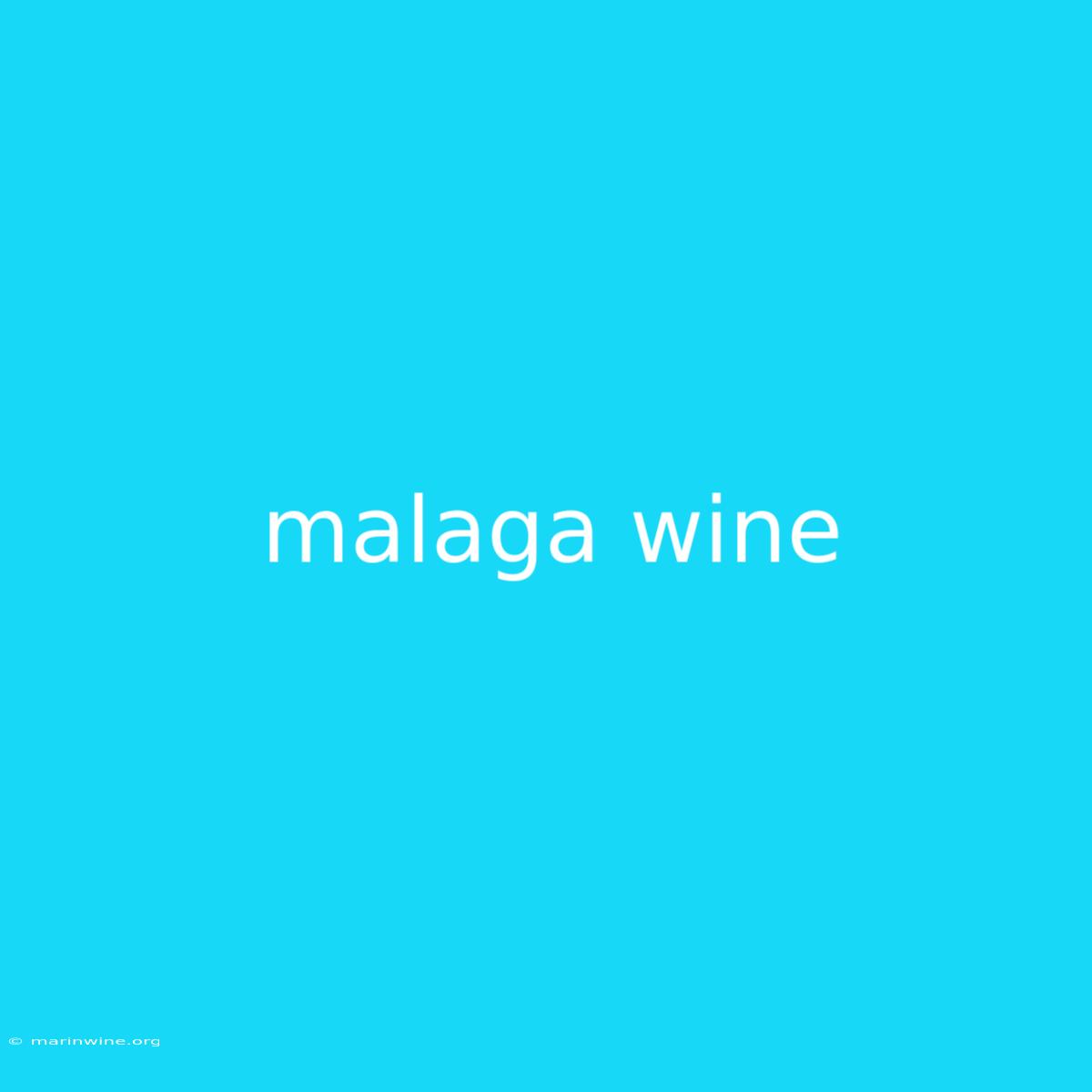Uncorking the Secrets of Málaga Wine: A Journey Through Spain's Sweetest Secret
Have you ever wondered about the unique sweetness of Málaga wine? This Spanish treasure boasts a history dating back to the Romans, and its distinctive character lies in the rich, sun-kissed grapes grown in the Málaga region.
Why It Matters: Málaga wine is experiencing a revival, and it's important to understand why this ancient tradition deserves a place on your wine list. Its history, production methods, and diverse styles offer a fascinating glimpse into the heart of Andalusian winemaking.
Key Takeaways of Málaga Wine:
| Feature | Description |
|---|---|
| Region: | Málaga, Andalusia, Spain |
| Grapes: | Pedro Ximénez, Moscatel, and other local varieties |
| Production: | Traditionally made using the "pasas" method, where grapes are dried in the sun. |
| Styles: | Ranges from sweet and fortified to dry and sparkling. |
| Taste: | Characterized by notes of honey, citrus, caramel, and dried fruits. |
Let's delve deeper into the fascinating world of Málaga wine:
Málaga Wine: A Legacy of Sweetness
The history of Málaga wine dates back to the Roman era, when the region was renowned for its high-quality wines. The pasas method, a unique production technique involving sun-drying grapes, gives Málaga wines their distinct sweetness.
Key Aspects:
- Pedro Ximénez Grape: This grape, responsible for the iconic sweetness of Málaga wines, is carefully dried in the sun, concentrating its sugars and creating a rich, intense flavor profile.
- Moscatel Grape: Another key grape variety, Moscatel adds a refreshing citrus note to the blend, balancing the sweetness with a delicate floral aroma.
- Sun-Dried Grapes: The pasas method is crucial to Málaga wine's character. Sun-drying allows the grapes to lose moisture, intensifying their sweetness and creating a unique flavor complexity.
- Fortification: Málaga wines are often fortified with alcohol, adding complexity and longevity to the final product.
Exploring the Diverse Styles of Málaga Wine
Málaga wine boasts a diverse range of styles, each with its own unique personality:
- Málaga Dulce: This classic sweet style is the most well-known, offering intense notes of honey, caramel, and dried fruits. Perfect for enjoying with desserts or as a dessert wine.
- Málaga Seco: This dry style, often made from the Moscatel grape, is less common but equally captivating. Expect notes of citrus, floral aromas, and a refreshing finish.
- Málaga Vino de Pasas: A category that encompasses both sweet and dry styles, this term signifies wines made from dried grapes, highlighting the pasas method's importance.
- Málaga Moscatel: These wines showcase the unique character of the Moscatel grape, offering a refreshing balance of sweetness, citrus, and floral notes.
The Connection Between Pasas and Málaga Wine's Sweetness:
The sun-drying process, or pasas, plays a pivotal role in shaping the sweetness of Málaga wines. As the grapes lose moisture, their sugar content increases, creating a concentrated and intensely sweet flavor profile. This technique has been practiced for centuries, contributing to the region's unique winemaking traditions.
Uncovering the Secrets of Málaga Wine
Málaga wine is more than just a sweet indulgence; it's a fascinating journey through time, tradition, and the power of the sun. Understanding its history, production methods, and diverse styles opens up a world of exciting discoveries.
FAQ for Málaga Wine
Q: What are the best food pairings for Málaga wine? A: Málaga Dulce pairs beautifully with desserts, cheeses, and spicy dishes. Málaga Seco complements lighter fare like seafood, salads, and appetizers.
Q: Are there any other wine regions in Spain that produce similar wines? A: Jerez de la Frontera (Sherry) is another region in Spain known for its sweet and fortified wines, though the grapes and production methods differ from Málaga.
Q: What are the best places to taste Málaga wine? A: The region of Málaga itself offers numerous wineries and bodegas where you can experience the full range of Málaga wines.
Q: What makes Málaga wines so special? A: Málaga wines are special due to their unique pasas method, resulting in a distinct sweetness and flavor complexity. The region's warm climate and centuries-old winemaking traditions contribute to their character.
Q: Can Málaga wines be enjoyed year-round? A: Absolutely! Málaga Dulce and Seco wines are versatile enough to be enjoyed year-round, offering a refreshing option for warmer months and a warming treat for cooler evenings.
Tips for Enjoying Málaga Wine:
- Chill it: Málaga wines are often best enjoyed chilled, especially the sweeter styles.
- Pair with care: Experiment with different food pairings to find what you like best.
- Explore the range: Don't be afraid to try different styles and producers to discover your favorites.
- Seek out local producers: Supporting local wineries can be a great way to experience the authentic flavors of Málaga wine.
Summary of Málaga Wine:
Málaga wine is a testament to the rich history and tradition of Andalusian winemaking. Its distinctive sweetness, crafted through the centuries-old pasas method, offers a unique taste experience. Whether you enjoy it with dessert, as a refreshing aperitif, or simply savor it on its own, Málaga wine is a journey waiting to be explored.
Closing Message:
Málaga wine is more than just a sweet delight; it's a window into the soul of Andalusia, a region steeped in history, culture, and the artistry of winemaking. So, raise a glass to the secrets of Málaga wine and embark on a delightful journey of discovery!

